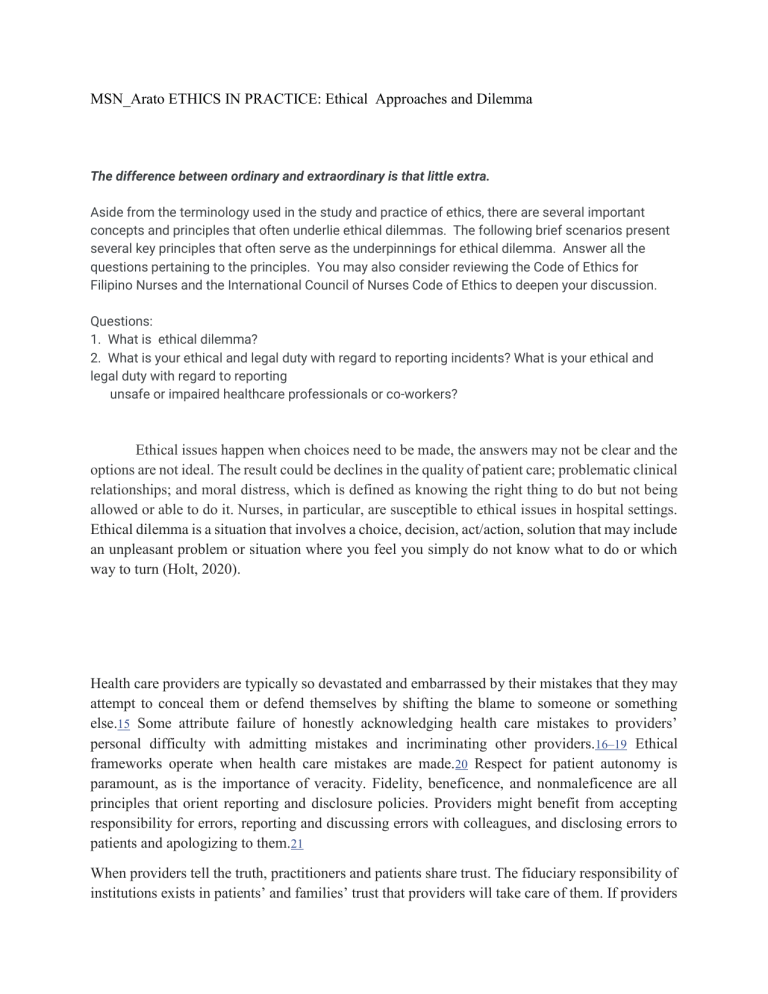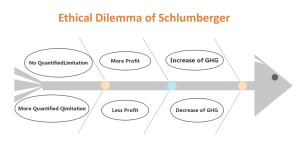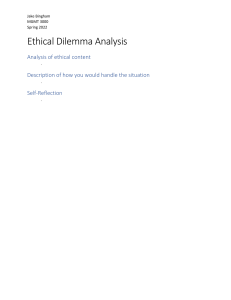
MSN_Arato ETHICS IN PRACTICE: Ethical Approaches and Dilemma The difference between ordinary and extraordinary is that little extra. Aside from the terminology used in the study and practice of ethics, there are several important concepts and principles that often underlie ethical dilemmas. The following brief scenarios present several key principles that often serve as the underpinnings for ethical dilemma. Answer all the questions pertaining to the principles. You may also consider reviewing the Code of Ethics for Filipino Nurses and the International Council of Nurses Code of Ethics to deepen your discussion. Questions: 1. What is ethical dilemma? 2. What is your ethical and legal duty with regard to reporting incidents? What is your ethical and legal duty with regard to reporting unsafe or impaired healthcare professionals or co-workers? Ethical issues happen when choices need to be made, the answers may not be clear and the options are not ideal. The result could be declines in the quality of patient care; problematic clinical relationships; and moral distress, which is defined as knowing the right thing to do but not being allowed or able to do it. Nurses, in particular, are susceptible to ethical issues in hospital settings. Ethical dilemma is a situation that involves a choice, decision, act/action, solution that may include an unpleasant problem or situation where you feel you simply do not know what to do or which way to turn (Holt, 2020). Health care providers are typically so devastated and embarrassed by their mistakes that they may attempt to conceal them or defend themselves by shifting the blame to someone or something else.15 Some attribute failure of honestly acknowledging health care mistakes to providers’ personal difficulty with admitting mistakes and incriminating other providers.16–19 Ethical frameworks operate when health care mistakes are made.20 Respect for patient autonomy is paramount, as is the importance of veracity. Fidelity, beneficence, and nonmaleficence are all principles that orient reporting and disclosure policies. Providers might benefit from accepting responsibility for errors, reporting and discussing errors with colleagues, and disclosing errors to patients and apologizing to them.21 When providers tell the truth, practitioners and patients share trust. The fiduciary responsibility of institutions exists in patients’ and families’ trust that providers will take care of them. If providers cover up errors and mistakes, they do not necessarily stay hidden and often result in compromising the mission of health care organizations. Consistent with their mission, institutions have an ethical obligation to admit clinical mistakes. Professional and organizational policies and procedures, risk management, and performance improvement initiatives demand prompt reporting. When patients, families, and communities do not trust health care agencies, suspicion and adversarial relationships result.18 Likewise, the breach of the principle of fidelity or truthfulness by deception damages provider-patient relationships.22 Fidelity and trust, implicit to the provider-patient relationship, do not coexist with deception.23 Physicians, nurses, and other health care providers have legal and ethical obligation to report risks, benefits, and alternative treatments through informed consent mandates. Legal self-interest and vulnerability after errors are committed must be tempered by the principle of fidelity (truthfulness and loyalty).24–26 This ethical principle has been reinforced by practical lessons learned from errors; especially when an adverse event causes serious harm or even death, there is an ethical and moral obligation to disclose information.27, 28 Candid reports and disclosure of errors by physicians as well as other health care providers (or institutional leadership if the physician refuses to disclose)19 might result in greater patient trust and less litigation.29 Furthermore, it is essential to act after errors are reported, with interventions aimed at protecting the welfare of patients by targeting iatrogenic problems and documenting the care given. Additionally, the ethical principles of beneficence (doing good) and nonmaleficence (preventing harm) are violated when errors are not reported or disclosed. These ethical principles, beneficence and nonmaleficence, shape caring nursing practice, and caring presupposes that nurses act in the best interests of patients. For example, sharing information and preventing harm to patients through truth telling, regardless of good or bad news, build relationships between elder residents and nursing home staff.30 Putting residents’ interests first represents nurse caring and characterizes relationships in which sharing information, rather than hiding it, surrenders nurses’ control related to withholding information. Thus, failure to disclose health care mistakes can be viewed from the perspective of provider control over the rights of patients or residents. 1. Collect, analyze, and interpret the data 2. State the Dilemma 3. Consider the Choices of Action 4. Analyze the Advantages and Disadvantages of Each Course of Action 5. Make the Decision 3. Case Scenarios: A. To Code or Not to Code Mrs. A is a 75 year-year-old with a history of uncontrolled DM, HPN, emphysema, and advanced lung cancer. She has had bilateral amputations and has partial paralysis from stroke. The cancer has metastasized. Two days she became disoriented and less responsive. Her AP discontinued her dialysis and considered her death "just a matter of time." The patient wants everything done. She will not sign a DNR (do not resuscitate) order, but the physician has talked to her two sons and is awaiting their reply. Mrs. A's cardiac monitor shows the following: HR= 52; BP= 76/52 mm/Hg, and RR= 32. Apply the decision-making process to determine what action should you take. What are the legal and ethical implications? You may also consider these questions to investigate: 1) Does the patient have a living will? 2) Can the sons override their mother's wishes to have everything done for her? B. Dina Gonzaga, RN, began her career as home health care Nurse 7 years ago, have worked as charge nurse on a busy medical-surgical unit for almost 10 years at Veteran's Hospital. She proved to be hardworking, very responsible, and reliable nurse with excellent assessment and nursing skills. She communicates well with patients and provides high level of care to all the patients assigned in her care. She has the reputation of being competent and hard working but rather inflexible when it comes to the interpretation of protocols, procedures, and SOPs. Her having a structured personality is an essential part of her psychological make-up and pervades all aspects of her life, including her religious beliefs and value system. A new patient has been admitted who is a 40-year-old male homosexual who is HIV positive and in the terminal stage of AIDS. He has decide to spend his final days at home rather than in a hospital ICU. This is the very first referral in your institution of a person living with HIV/AIDS. After consideration of the various qualifications and experience levels of the nurses available, as well as their patient loads, the director decides that Dina would be the most qualified nurse to take care for this patient. The director places the referral form and chart on Dina's desk with a note to see the patient before the end of the week. Later that day when Dina returns from her morning visits, she discovers the referral and chart on her desk. After reviewing the chart and the referral form, she storms in the director's office, throws the chart down on the director's desk, and states in a loud voice: "I cannot take care of ta patient with AIDS. My religion teaches that homosexuality is a sin against nature and God and I believe that AIDS is the punishment for that sin!" Questions: If you were the director, how would you handle the situation? Use the ethical decision-making model in solving this problem. 1. What are the important data in relation to this situation? 2. What is the ethical dilemma? State it clearly and simply. 3. What are the choices of action, and how do they relate to specific ethical principles? 4. What are the consequences of these actions? 5. What decisions can be made? Other factors to consider: Are there any situations when a nurse can ethically (and legally) refuse a work assignment? What effect will the final decision have on the other staff nurse? C. Read the articles and write down key points, takeaways and personal reflection on the material. What is/are the ethical principle/s that can be applied in these scenarios? Please click on the links to view the article..1. “Mask or no mask? This simple ethical approach can help with your pandemic etiquette” 2. “What’s the point of an ethics course?” Patient Safety and Quality: An Evidence-Based Handbook for Nurses. Hughes RG, editor. Rockville (MD): Agency for Healthcare Research and Quality (US); 2008 Apr. Contents Error Reporting and Disclosure Zane Robinson Wolf; Ronda G. Hughes. Holt, D. (2020, October 30) What is a Moral (Ethical) Dilemma. Retrieved January 31, 2023 from https://viva.pressbooks.pub/phi220ethics/chapter/what-is-an-ethical-dilemma/ Hussain, A. (2019). 7 Habits of Highly Effective People [Summary & Takeaways]. Retrieved February 19, 2020, from https://blog.hubspot.com/sales/habits-of-highly-effectivepeople-summary

